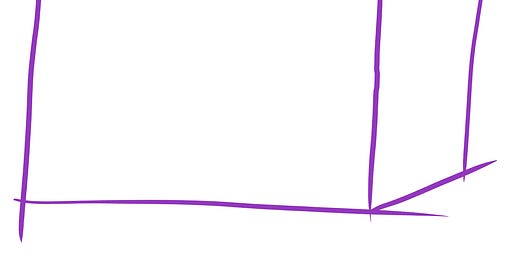Showing Up is Half the Battle
How to Turn Simple Tasks into Complex Problems and Look Smart Doing It
This article was gracefully inspired by
from his Note:It's a great and genuine post, and this article is in no way a reflection on Michael's Note, I just wanted to make something funny (I was originally intending for this to simply be a reply to Michael's Note, but I got a bit carried away)—apologies for breaking character for this article, on with the show!
So if you're working under the assumption of aiming for the 80/30 rule, we can postulate that, assuming 1,000 words is the ultimate goal:
0 words:
250 words:
1,000 words:
Then we correct for our odd thinking and silly logic:
0 words:
250 words:
1,000 words:
We then come to the realization that we're overthinking things:
0 words: Being silent can be seen as just another form of expression—this is what content creation is all about!
250 words: Halfway to somewhere, but where? Is half a thought better than having none? Is it even possible to have half a thought? Kind of like apartment ads showing 2.5 rooms—it's still a full room, just smaller!
1,000 words: A full treatise on nothingness. I feel like I’m in a Seinfeld episode. Does it count if these thousand words are describing my feelings of indecisiveness during the lunch rush at my local sushi place? Whoops, I should probably order something.
This Note is the story all about how, My writing got flipped-turned upside down, And I'd like to write a thousand, So sit and stare, I'll tell you how I made you wince with my writing flare.
Now, on to more important matters—I’ve managed to mathematically justify (with 100% certainty, you can totally trust me, no need to verify), procrastination and verbosity.
I’ll take my Note-bel prize now, thank you most kindly.
What lessons can we take away from my succinct and to-the-point, no fluff, no-nonsense note?
Well firstly, we shouldn't overthink stuff. Stuff, in this context, is the nomenclature for a variety of things. More specifically, I'm referring non-ambiguously, of course, to matter that combines in such a way to form what are commonly known, in layman's terms, as objects.
This is an example of an object:

Its scientific name is cubicusplainicus, and originally was in reference to the great ‘Copernicus the Bland’—not to be confused with 'Copernicus a Star is Born III' thrice removed.
So, remember kids, overthinking is the art of creating solutions to problems we imagine up in order to solve them—but problems that are imagined can also be solved using our imagination, so do that instead.
P.S. If someone ever asks you for your working out, smile and nod then point to something complicated. Gets 'em every time.
P.P.S. You should probably check your work for any errors and to ensure logical consistency and accuracy. Not me though, I'm far beyond doing stuff like that, what I write is perfect and there's most certainly not any strategically placed, deliberate errors or any such nonsense, I'll hear nothing of it!
Fin
That's it for now, as always,
Good luck,
Stay safe and,
Raise hell





